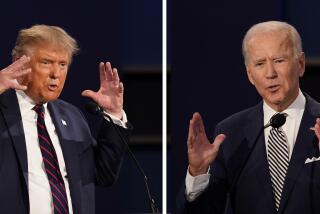CNN, American Airlines: All the News That Fits : Television News: Proposed agreement on censored in-flight newscasts is great for business, bad for journalism.
- Share via
What happens when sales values are given priority over news values? This is what happens.
Ted Turner’s Cable News Network may soon be providing in-flight newscasts to passengers of American Airlines. Well enough. Except that these “Headline News” segments from CNN--which bills itself as “your network of record”--would omit part of the record to satisfy American.
They would leave out news of “major air disasters.” There’s an ugly word for that: censorship.
The agreement with American by Turner Home Video--merchandising arm for Turner’s vast cable TV empire--has yet to be signed and could even be revised in light of the negative publicity it has generated. “A lot of discussion is still going on,” CNN spokesman Steve Haworth acknowledged from Atlanta.
As for now, however, the agreement is set to take effect March 1.
Speaking from Dallas, American spokeswoman Mary O’Neill outlined some of the provisions:
In addition to being required to delete news of “major air disasters,” CNN would have “consultations” with American in regard to withholding pictures and running only sound from stories of “airline incidents, terroristic threats, bombs and that sort of thing,” O’Neill said.
“Our research showed that it was the visuals of the wrecked planes and all the carnage that upset our customers terribly,” she said. Just about any crash would constitute a “major air disaster,” she said. “Except if it’s a Piper Cub or something like that.”
So now American Airlines is in the news business.
Although it’s hard to imagine a bona-fide journalist endorsing this, one news report quotes a Turner Home Video executive as saying that CNN president Bert Reinhardt had been aware of the deal, as was Ted Turner. Neither could be reached Friday.
Also unavailable was Ed Turner, CNN’s executive vice president for newsgathering, who is said to have replied when asked about omitting negative stories about airlines on in-flight newscasts to please American:
“As a passenger, it would probably make me feel better, but as a journalist, it doesn’t.”
Amen.
The deal--giving American’s passengers news and giving CNN continuous exposure on a major air carrier--is terrific for business.
And terrible for journalism.
You can understand American’s position: Don’t make the passengers nervous. But a news organization in effect relinquishing some of its editorial control to an outsider in even a limited way? It’s impossible to justify.
Not that CNN isn’t trying anyway. “Our thinking is that you have a captive audience that doesn’t have the opportunity to turn off the television set, and we didn’t want to be panicking and terrorizing these people stuck on an airplane,” said spokesman Haworth. “In my opinion, this is an improvement over the previous policy.”
An improvement ? That just won’t fly.
The “previous policy” Haworth refers to is the one that has guided CBS News in supplying American with its regular newscasts for the last six years. For each newscast, American had a choice: Take it all or don’t take it at all.
“We sell a broadcast in its entirety,” said Dave Berman, vice president of production and administration for CBS International, the CBS marketing division that refused to renew American’s soon-to-lapse contract with CBS News because of the editorial clout sought by American.
“In the past, if there was a crash or an incident involving a terrorist attack on an airplane, or a near miss, or pilot error or substantial abuse by an airline or the FAA (Federal Aviation Administration) or anything detrimental to American, we would withhold the entire broadcast from the American planes,” Berman said. “We did that because we understood American’s position. But that doesn’t mean we can change the news.”
Bad attitude.
Under the new contract proposed by American, Berman said, CBS was to “edit (negative) material out of the broadcast and send them the rest of the broadcast.” According to Berman, CBS retorted: “You don’t cut holes in a newspaper on the plane, and neither would we cut holes in a news show.” It would violate CBS News policy, he said.
Wouldn’t American’s O’Neill agree that the restrictions imposed on CNN amount to censorship? “We feel that pulling the whole show is a more severe form of censorship,” she said.
American is hardly the only airline using in-flight network newscasts. However, none of the other airlines using CBS newscasts have requested deletions, Berman said.
NBC’s contract to provide Pan Am Airways with in-flight news expired recently, but the network is negotiating with another airline. “Our news on Pan Am was aired in its entirety and was not edited in any way, and that policy won’t change,” an NBC spokeswoman said. However, she was unable to say if the in-flight news on Pan Am included stories about the explosion of Pan Am 103 over Scotland.
An ABC spokesman said that United Airline runs an in-flight magazine prepared weekly by the network, but that the stories are features and the matter of deletions “hasn’t come up.”
American will not be the only in-flight outlet for CNN, which already supplies “Headline News” to Delta, Swissair, Qantas and USAir. However, Haworth declined to give details of CNN’s contracts with those airlines.
O’Neill said that it was not editorial content, but profits that primarily concerned American about its contract with CBS. “It was just not as profitable for the airline as we would have liked,” she said. And the new contract about to be signed with CNN is more profitable? “Oh, yes,” she said.
More to Read
The biggest entertainment stories
Get our big stories about Hollywood, film, television, music, arts, culture and more right in your inbox as soon as they publish.
You may occasionally receive promotional content from the Los Angeles Times.










